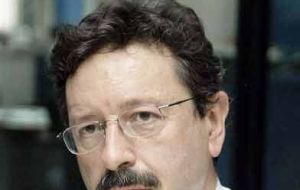MercoPress. South Atlantic News Agency
Ending BBC Caribbean Service considered politically unwise for region’s public opinion
 David Jessop, director of the London-based Caribbean Council
David Jessop, director of the London-based Caribbean Council BBC Caribbean Service has made its final broadcast, ending seven decades of programming for the region. The service is being shut as part of budget cuts announced by the BBC World Service in January.
BBC managers say they have had to make tough choices because of a 16% cut in UK government funding. But one critic called it a short-sighted decision, showing the BBC did not understand the complexities of the region.
The Macedonian, Albanian, Serbian and Portuguese for Africa services have also been closed in a bid to save £46m a year. Seven other language services have moved away from radio to focus on online, mobile and television content.
These include Spanish for Latin America which last month ended its remaining radio broadcasts, on short-wave and intended mainly for Cuba. This week, members of the Caribbean Service team have each presented a final program, including material from the BBC archives.
Copies of the sound and text content of the service's radio and online output are being donated to the University of the West Indies, which will have a team working at the BBC's Bush House base to catalogue the material.
E-mails to the Caribbean Service overwhelmingly voiced sadness at its closure.
Regional media commentators have said the demise of the BBC Caribbean Service should spur renewed efforts to create a pan-Caribbean news network.
“Since the announcement, we have come to truly know the important role we have been playing across the Caribbean. We're going out on a high - what more can any broadcaster ask for?” said Caribbean Service head Debbie Ransome.
The origin of the Caribbean Service was Calling the West Indies, a program that began in 1939, featuring West Indian troops on active service during World War II reading letters to their families.
From 1943 to 1958, it became Caribbean Voices, highlighting West Indian writers, including VS Naipaul, George Lamming, Andrew Salkey and Samuel Selvon. In 1949, We See Britain was introduced as part of the programming for the Caribbean under the management of cricketer-turned-producer Ken Ablack.
Over the next three decades, the Caribbean Service nurtured producers and presenters, including Trevor McDonald who became one of the best-known newsreaders on British television. The service closed in the mid-1970s, but in 1988 it reopened as a news and current affairs department.
David Jessop, director of the London-based Caribbean Council, has described the closure as another marker of Britain's “less than joined-up approach to the region”.
In an article at the time of the announcement in January, he said: “The sole vehicle offering the region the chance to hear on a daily basis about events from a broader perspective and sometimes hold politicians to account, will be no more and leading figures in public life will find it virtually impossible to present their views to a region-wide radio audience.”
Announcing the cuts, BBC Global News director Peter Horrocks said the closures were “not a reflection on the performance of individual services or programs”.
“They are all extremely important to their audiences and to the BBC,” he said.
“It is simply that there is a need to make savings due to the scale of the cuts to the BBC World Service's grant-in-aid funding from the UK's Foreign and Commonwealth Office, and we need to focus our efforts in the languages where there is the greatest need and where we have the strongest impact.”




Top Comments
Disclaimer & comment rules-

-

-

Read all commentsIt's not just the Caribbean that feel that this is the end of an era - the Russian service and the Chinese service have been similarly closed down., as well as many minor services.
Mar 27th, 2011 - 02:39 pm 0Importantly, why close Russia and China?
These are major world players that might benefit as would the UK from the cultural dimensions of these world services in the English and indigenous languages.
If the new BBC Online is anything to go by, these great 'overseas' provisions will be replaced by Tweets, Twitters and other 'social-network'-type anodyne substitutes.
Their could be many reasons why the BBC is scaling back so fast,
Mar 27th, 2011 - 07:55 pm 0some say a retirement of the UK in general.
But then again she is a powerful unit, taxpayer funded,
but like a lot of things nowadays she becomes top heavy with money.
And bottom light with pennies, the BBC does a lot of good, but she could do better, but lack of interest in the public, and more essence on paying over the top performers and the like, millions of pounds just got to much. mm
Lol. Jack Warner (Fifa)was heavily influenced by the BBC. So influenced in fact that he voted against England getting the Football World Cup. Not that I'm bothered - hate Football, love Rugby (Union).
Mar 29th, 2011 - 10:14 am 0Commenting for this story is now closed.
If you have a Facebook account, become a fan and comment on our Facebook Page!